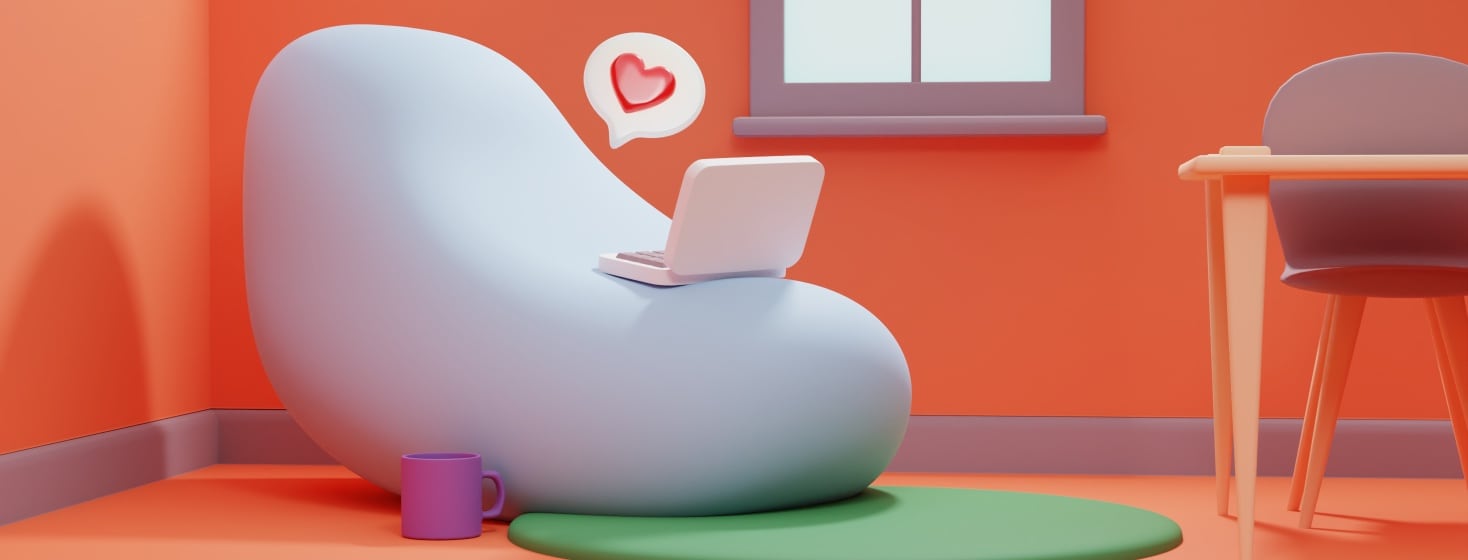Work From Home Environment and Adjusting for RA Pain
I have been lucky enough to work from home since long before the pandemic began.
Due to my chronic illnesses, I have placed myself in industries and taken jobs that hold flexibility and accommodations when it comes to my working conditions.
My work setups have not been ergonomic
But, I’ll be the first to tell you that I haven’t always been smart about the work environment I’ve created in my home.
In the past, I found myself spending copious amounts of time working from one of a few places - my desk chair in my office, my living room couch, my kitchen table, and my bed.
Spoiler alert! None of these locations were ergonomic-friendly enough to set myself up for success when it comes to my joints.
Different types of seating
Let’s start with my desk chair. It’s a typical office chair, more fashionable than functional, and I use a regular sitting desk.
Desk chair
However, without a stool underneath for my feet, I find my back ends up fairly hunched over, my knees ache from being bent at 90 degrees, and I find it hard to focus for long periods of time.
Couch
When I move to the couch, I am more comfortable, no doubt, but I’m also not sitting in an ideal way to support my joints.
I’m usually resting my laptop on my inner thighs as I sit with my ankles crossed and my wrists flat on the keyboard.
Too much time in this position isn’t helpful either.
Kitchen table
My kitchen table is a variation of my office - with a harder chair and a bit higher of a table. There are minimal advantages to this workspace outside of its proximity to snacks ;)
Bed
And my bed - probably the most comfortable, but the least practical for working.
As someone who struggles with insomnia, I used to be adamant that I only did sleep and relaxation-related things in my bed.
However, when my joint pain is high and my RA symptoms are bothering me, my bed is the easiest place to find comfort.
I use pillows and blankets to pad my aching areas and find an incline that feels right with my back and shoulder alignment.
Searching for a comfortable seating option
The only problem? I often then want to doze off to sleep. The comfort is ideal, but the location is not. That led me on a search through adult bean bag chairs.
After watching what felt like a thousand Youtube videos and reviews, I was convinced that the distribution of bean bag particles would provide both support for my joints and structure for working, especially if placed in my home office.
Deciding on the Moon Pod
Ultimately, I settled on the Moon Pod.
Although a definite investment, I was adamant that it would be worth the price tag if it could provide me both physical relief and a practical option for spending my workdays.
Benefits of the Moon Pod
I'm now 3 months into using my Moon Pod daily, and I have to tell you that I am so grateful for it.
Ergonomic joint support
The unparalleled support and flexibility of the Moon Pod enable me to find ergonomically advantageous positions for my back, shoulders, hips, and legs.
The high-density beads inside mimic floatation therapy, providing soft, structured support in a gentle manner.
The biggest benefit to me, however, is the way it supports my knees. They rest comfortably without any pressure, and I'm not distracted by the pain or position I'm working from.
Easy to move around
Another major benefit? The entire Moon Pod weighs just 12 pounds, which means it's extremely easy for me to move and position on my own.
Recently, I've been guilty of dragging it from my office to our living room after the workday so I can stay seated in it while watching TV at night.
What type of chair or couch do you find is most amenable to your RA body for work focus and at-home relaxation?
Have you tried the Moon Pod or any type of adult bean bag chair?

Join the conversation